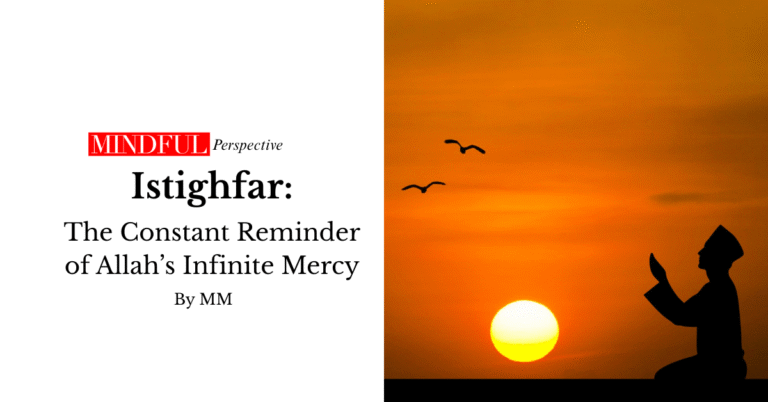By Misbah Momin
In today’s fast-paced, tech-driven world, our devices often feel like the most important members of the family. While technology brings convenience, it also distances us from what makes us truly human—our relationships, our inner peace, and our connection with our Creator.
This disconnection has left many of us feeling off-balance. Anxiety, depression, insomnia, panic attacks, and a persistent sense of restlessness are becoming all too common. But amid the chaos, there exists a timeless, powerful, and deeply accessible spiritual solution: Istighfar—seeking forgiveness from Allah.
Istighfar is the act of seeking Allah’s forgiveness. But it’s more than just repeating “Astaghfirullah” with our lips—it’s a heartfelt return to our Creator. It’s a spiritual reset, a means to realign ourselves with Allah’s mercy, love, and guidance. The Holy Qur’an and Hadith emphasize its significance, benefits, and power to transform lives.
Surah Hud (11:3): “And seek forgiveness of your Lord and repent to Him, and He will let you enjoy a good provision.” This ayah highlights how Istighfar leads to a life of blessings and contentment.
Surah Nuh (71:10–12): “Ask forgiveness of your Lord. Indeed, He is ever a Perpetual Forgiver. He will send [rain] from the sky upon you in showers, and increase you in wealth and children, and provide you gardens and rivers.” Istighfar not only purifies the soul—it brings tangible blessings in this life.
Surah Az-Zumar (39:53): “Say, ‘O My servants who have transgressed against themselves, do not despair of the mercy of Allah. Indeed, Allah forgives all sins…’” No sin is too great for Allah’s mercy. This verse is a beacon of hope.
Surah Al-Baqarah (2:222): “Indeed, Allah loves those who are constantly repentant and purify themselves.” Repentance is beloved to Allah. He loves when His servants turn back to Him.
Surah An-Nisa (4:110): “Whoever does a wrong or wrongs himself but then seeks forgiveness of Allah will find Allah Oft-Forgiving, Most Merciful.” The door to Allah’s forgiveness is always open—no matter the sin.
The Prophet Muhammad (PBUH), though sinless, sought forgiveness over 70 times a day: “By Allah! I ask forgiveness from Allah and turn to Him in repentance more than seventy times a day.” — (Sahih al-Bukhari 6307) Even he never took Allah’s mercy for granted.
“Whoever makes Istighfar a regular habit, Allah will provide for him a way out from every trouble, a relief from every anxiety, and provision from where he does not expect.” — (Sunan Abi Dawood 1518) This Hadith highlights Istighfar as a solution for life’s worries.
“If you were not to commit sins, Allah would replace you with a people who would sin and seek His forgiveness—and He would pardon them.” — (Sahih Muslim 6622) Allah doesn’t expect perfection—He expects sincerity.
“Be merciful to others, and you will receive mercy. Forgive others, and Allah will forgive you.” — (Musnad Ahmad 7001) Forgiving others invites divine forgiveness.
“Have mercy on those on earth, and the One above the heavens will have mercy on you.” — (Sunan al-Tirmidhi 1924) When we act with compassion, we open ourselves to Allah’s mercy.
We’re surrounded by distractions, overwhelmed by responsibilities, and worn down by stress. Istighfar helps us cleanse our soul of sins and guilt, ease mental burdens and emotional weight, and reconnect with Allah—the source of all peace and clarity.
“Unquestionably, by the remembrance of Allah, hearts are assured.” — Surah Ar-Ra’d (13:28)
The best times for Istighfar include:
- Before Fajr / End of the Night — “And in the hours before dawn, they would seek forgiveness.” — Surah Adh-Dhariyat (51:18)
- After Obligatory Prayers — The Prophet (PBUH) said “Astaghfirullah” three times after each salah. — (Sahih Muslim 591)
- During Rainfall — A moment of divine mercy—ideal for making sincere dua and Istighfar.
- In Sujood (Prostration) — The closest we come to Allah. An intimate time to seek forgiveness.

- Anytime You Remember Allah — No set time is required. Istighfar is always accepted when sincere. “So remember Me; I will remember you.” — Surah Al-Baqarah (2:152)
Simple ways to make Istighfar a habit:
- Start and end your day with “Astaghfirullah” (10–100 times)
- Reflect after each salah—take a pause to sincerely repent
- Use idle moments (in traffic, waiting, walking) for dhikr
- Write your own dua of repentance and read it often
- Forgive others, freeing your own heart in the process
Istighfar isn’t just a ritual—it’s a lifeline. The more we reflect on the verses of the Qur’an and teachings of the Prophet (PBUH), the more we realize that Istighfar is an ocean of mercy. Those who dive in return with purified hearts and peaceful souls.
It is Allah’s gift to His servants—a way back, no matter how far we’ve strayed. A path to healing, renewal, and closeness with our Creator.
“And Allah would not punish them while they seek forgiveness.” — Surah Al-Anfal (8:33)
Let us hold onto Istighfar as a shield, a balm, and a key to inner peace. May we seek it sincerely, receive it abundantly, and live in the light of Allah’s forgiveness.



